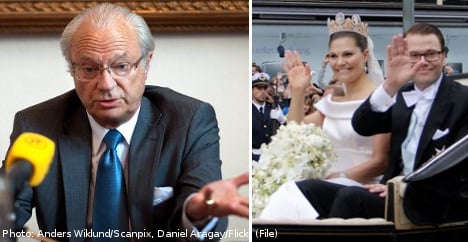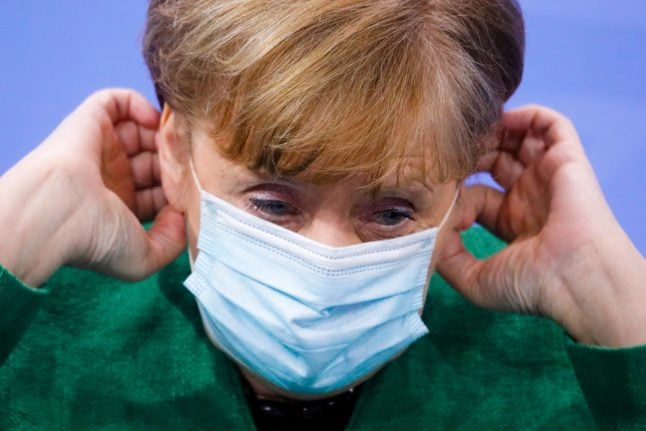About a year ago, June 19th, 2010, was a picture perfect day in Stockholm. At the time, royal well-wishers flooded into to Stockholm in droves, hoping to catch a glimpse of the newly married Crown Princess Victoria and her former personal trainer-turned-prince beau, Daniel Westling.
The city of Stockholm arranged “Love Stockholm 2010”, a two-week festival in celebration of the Crown Princess and her husband, and support for the monarchy reached a whopping 74 percent.
Simply put, enthusiasm for Sweden’s royal family was hitting new heights as the country’s first royal wedding in more than 30 years swayed many to conclude that, heck, maybe having a monarchy isn’t so bad after all.
But fast-forward the tape a little, and one finds that last year’s wedding fairy tale has given way to scandal, scorn, and a healthy dose of royal scepticism.
Today, figures show that the monarchy is backed by no more than 66 percent of the populace, and the rosy glow surrounding the institution after the royal wedding has faded fast, in a turbulent year that has had the King facing a deluge of negative publicity.
“The recent events are of course serious in the short run,” Jenny Alexandersson, a royal correspondent with tabloid Aftonbladet, tells The Local.
“We can see that the King’s popularity figures have taken a dive.”
Serious trouble began in November with the publication of an unathorised tell-all book, “Carl XVI Gustaf – den motvillige monarken” (“Carl XVI Gustaf – the reluctant monarch”).
The controversial book detailed the King’s alleged visits to porn clubs, claims of an affair, as well as alleged connections to the criminal underworld.
While initial buzz from the book died down after a few weeks, reports surfaced in May that a close friend of the King had turned to a reputed gangster for help in burying incriminating pictures of the King and his friends.
Royal scandal once again swept across Sweden, with the King finally agreeing to a lengthy and highly-questioned interview with news agency TT in an attempt to clear his name.
Once again Sweden found itself pondering the role and significance of the monarchy.
However, when asked about the long-term consequences of the past year’s crises, both Alexandersson and Roger Lundgren, previous editor of Queen magazine and expert on the royal family, are confident that the monarchy’s popularity will recover.
“Absolutely,” Lundgren says emphatically.
Peter Althin, chair of the Swedish Republican Association (Republikanska föreningen), is not so sure, however.
He called the current situation an “extraordinary crisis” for the monarchy in an interview with newspaper Dagens Nyheter (DN), and welcomes the growing support for a republic.
“It’s encouraging and positive that the support for the monarchy is pointing down. If things continue at this rate, the majority will soon be against it,” Althin says.
Alexandersson points out, however, that support for the monarchy has been stable at roughly 70 percent for decades.
Whether the monarchy as an institution will eventually regain the backing of the general public, or support will continue to decline is still a matter of prediction.
Either way, a nearly 10 percent unit drop in popularity in just one year is a backslide which should give the royal family pause, according to experts.
In the wake of the scandal, speculation has arisen as to whether the allegations against the King and the hefty drop in popularity will lead to the King’s early abdication, with daughter Victoria taking over the throne.
“Many are now calling for him to be replaced by his daughter, but I think we should change the system of government altogether, and free the children from these inherited positions too,” Althin says.
Alexandersson casts doubt on the scenario, however.
“The King will not retire. One is a monarch for life, and I know that the King has no current plans to abdicate,” she explains.
Lundgren agrees, pointing out that abdication would also be unfair to Victoria.
“Victoria has to get some time for herself, start a family and have some kids, and I doubt that anyone begrudges her this,” he says.
Putting the King’s own plans aside, recent polling figures make it clear that a rapidly growing percentage of the public feel that his days as regent should be numbered.
Polls published in May showed a dramatic increase in popularity for Victoria as monarch, with 41 percent of respondents hoping to see the Crown Princess take her father’s place, while 44 percent believed the King ought to stay on as regent.
The results mark a significant reversal from a year ago, when point 64 percent backed the King to stay on as regent, and only 17 percent wanted to see Victoria take over.
The King’s fate, however, may be tied less to the veracity of the claims about his scandalous past than to how he has dealt with them.
His interview with TT has been especially criticised, with many voicing doubts about the honesty of the King’s answers.
“If the whole story was nothing but spiteful slander, why didn’t the King come out and say so immediately, last autumn?” wondered Peter Wolodarski, leader page editor of newspaper Dagens Nyheter (DN), and one of several to question the King’s answers.
Wolodarski wrote that, by going through with the TT interview the King “tripled the stakes in his own crisis of confidence”.
“If facts do turn up showing that the King lied, he will have placed himself in the uncomfortable position in which the lies may come to be a far bigger problem than the actions he lied about,” he explained.
Lundgren is critical of the King’s decision to go through with the TT interview, arguing that the King should speak directly to his subjects rather than exposing himself to such interviews and “disgusting” reporting.
“But I have a hard time believing that the people of Sweden would be all that upset, even if the allegations are true. I think it’s mostly tabloid press that’s outraged,” Lundgren says, criticising these newspapers as “gossip rags”.
This view, however, currently seems to be in the minority, and is refuted by Aftonbladet’s Alexandersson, who believes the allegations against the King are serious and demand the media’s attention.
“We can’t have a head of state that has contact with criminals,” she explains.
“The King’s body guards and security arrangements are paid for through our taxes. This means that we Swedes have the right to know if the King is exposing himself to an increased risk, through criminal connections or risk for extortion.”
Alexandersson believes that if proof of the King’s involvement is unveiled, a discussion about his abdication will be necessary.
“If it turns out that the King has known about these criminal contacts and also lied about them in the TT interview, we’re facing a constitutional crisis,” she says.
And should that happen, it would only serve to make last year’s royal wedding, which has so captivated the nation and quickly catapulted Sweden’s monarchy to new heights, seem more like a distant memory.



 Please whitelist us to continue reading.
Please whitelist us to continue reading.
Member comments